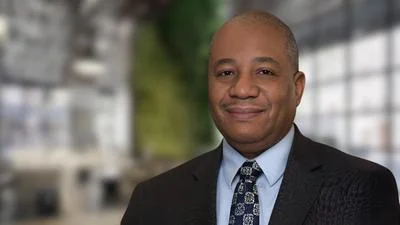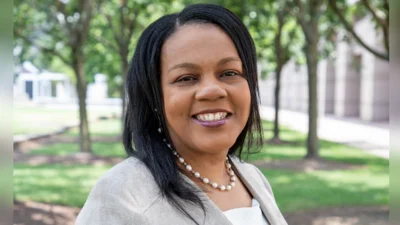Jay DeLancy of Voter Integrity Project. | Submitted
Jay DeLancy of Voter Integrity Project. | Submitted
Elections should be determined by who gets the most votes. Legal votes, that is, and there is a serious question about voter rolls in North Carolina where some conservative activists are trying to clear dead people, nonresidents and people committing outright fraud from lists.
Judicial Watch filed a lawsuit against state election officials as well as those in Mecklenburg and Guilford counties over their voter registration rolls.
Judicial Watch alleges there are thousands of people registered to vote who are no longer eligible or never were.
In North Carolina, if a voter misses a pair of federal elections over a four-year period and a letter sent to them by election officials is returned as “undeliverable,” they are deemed inactive. If they do not vote in the next four years, they must be removed from the rolls.
Judicial Watch President Tom Fitton said there may be as many as 1 million names of people ineligible to vote on North Carolina rolls. State and county officials denied that allegation.
Fitton said about 17 percent of North Carolina’s registrations were inactive,” the fifth-highest total in the country. He said in 19 counties, 20 percent or more registrations were inactive, and three counties reached 25%.
“Large proportions of these registrations have shown no activity for over five years,” Fitton said in news release. “That’s before the November 2014 elections!”
Jay DeLancy has been studying the issue for nearly a decade.
He believes everyone should have the right to vote — as long as they are a U.S. citizen and are properly registered to vote. They also need to observe the one-voter, one-vote rule.
Sadly, that is not always the case, he says. It’s why the retired Air Force lieutenant colonel has spent nearly a decade researching voter ID fraud and other election problems.
DeLancy is director of the Voter Integrity Project-North Carolina, a 501(c)(4), non-profit organization dedicated to open and honest elections.
Using forensic audits it has uncovered almost 30,000 deceased people on North Carolina voter rolls, more than 500 registered voters who said in court that they were not U.S. citizens, and a three-state criminal investigation into 149 cases of suspected interstate-double voting that triggered multiple criminal referrals, five felony indictments and four convictions. People were registered to vote in North Carolina, Florida or Tennessee. This, almost assuredly, happens in other states well, DeLancy believes.
“Absolutely does,” DeLancy said. “You can find a lot of people if you take the effort. But the states won’t. It’s just too hard.”
What’s even more frustrating are the times the group has uncovered clear evidence of voter fraud but prosecutors refused to move on the cases.
“We had one case in Florida where the investigator said he had a sworn statement from the mother, the mother admitted to committing voter fraud,” DeLancy said.
They took it to the local district attorney and he chose to ignore it.
“He had all the evidence he needed to prosecute it and he would not,” DeLancy said. “It is a very difficult crime to detect and we did. The prosecutor in charge blew it off. So that does not count as voter impersonation because it was never proven in court.”
He said members of his group and other voter ID advocates research cases and bring evidence to law enforcement agencies. If they will agree to investigate, which often is a challenge, many times the prosecutor will ignore the matter.
“It’s very difficult to get it prosecuted,” DeLancy said. “I think there are elements that do not want this to go away for very strategic reasons.”
While prosecutors are largely disinterested, he said police departments, sheriff’s offices and other law enforcement agencies aren’t much better. It’s not as if they are eager to look into such matters.
“I wish that was the case,” DeLancy said. “Most of them are scared of their political handlers. Politicians don’t want to do it — and district attorneys are politicians.”
DeLancy, 62, is a co-founder of the Voter Integrity Project, which has combined the skills of computer scientists, auditors and analysts to form a team of analysts who seek to reduce or eliminate election law flaws and uncover flawed election procedures, ranging from inept and untrained election boards and employees to outright fraud.
DeLancy urges “John Q. Public” to get involved as well by bringing this issue to the attention of elected officials, both Democratic and Republican, and pushing for reforms.
“We need open and honest elections,” he said. “And without voter ID, we get neither.”
The National Voter Registration Act of 1993 was aimed to change the pattern of declining voter registration by allowing people to register at their local motor vehicle department.
The so-called Motor Voter Law that President Bill Clinton signed into law in 1993 — the first bill he signed — is at the root of many of the issues, DeLancy said.
“So many problems,” he said. “Bill Clinton wanted to flood the rolls with illegal aliens and he did.”
Before the law was enacted, voter applicants had to prove to a government employee that they were who they said they were. A city or state employee would personally see an ID and sign up the voter.
He said people who obtained driver’s licenses — even if they admitted they were non-citizens — were then offered a chance to register to vote.
“DMV never had that authority until Motor Voter,” DeLancy said. “I think it’s mainly incompetence but there is some crookedness too.”
Reports indicate there are 29 states with counties that have more registered voters than adult residents. In total 244 counties nationally somehow have more people on the rolls than live inside their boundaries.
Judicial Watch also notified county officials in California, Pennsylvania, Virginia and Colorado that it was investigating voter rolls and would file lawsuits to ensure proper maintenance of those lists was performed.
DeLancy said he is frustrated when critics say attempts to create and enforce voter ID laws are racist.
“At the end of the day, voting is the great equalizer among all of our civil rights,” it states on the Voter Integrity Project website. “When each American citizen enters that voting booth, we all are equal, regardless of skin color, party affiliation, social status, religious beliefs, etc. Every time another voter steals a second vote, our votes and yes ... our civil rights … are violated.”






 Alerts Sign-up
Alerts Sign-up